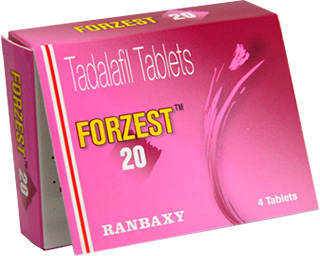  | Forzest is an oral drug, used for treating male impotence, also known as men's erectile dysfunction. Active Ingredient: Tadalafil Availability: In Stock (6 packages) |
| Product name | Per Pill | Savings | Per Pack | Order |
|---|---|---|---|---|
| 10 pills | $8.06 | $80.56 | ADD TO CART | |
| 30 pills | $5.61 | $73.47 | $241.68 $168.21 | ADD TO CART |
| 60 pills | $4.99 | $183.68 | $483.36 $299.68 | ADD TO CART |
INDICATIONS
Forzest (Tadalafil) is an effective treatment for men's erectile dysfunction.
INSTRUCTIONS
Forzest tablets must be taken orally. Take Forzest about one hour before you plan to have sex. Beginning in about 30 minutes and lasts for up to 36 hours, Forzest can help you get an erection if you are sexually excited. If you take Forzest after a high-fat meal, the medicine may take a little longer to start working.
If you miss a dose of Forzest, take it as soon as possible. If it is almost time for your next dose, skip the missed dose and go back to your regular dosing schedule. Do not take 2 doses at once.
DOSAGE
Use exactly as prescribed by your Health Provider.
STORAGE
Store Forzest below 86 degrees F (30 degrees C). Store away from heat, moisture, and light. Do not store in the bathroom. Keep Forzest out of the reach of children and away from pets.
SAFETY INFORMATION
Some medical conditions may interact with Forzest. Tell your doctor or pharmacist if you have any medical conditions, especially if any of the following apply to you:
if you are pregnant, planning to become pregnant, or are breast-feeding
if you are taking any prescription or nonprescription medicine, herbal preparation, or dietary supplement
if you have allergies to medicines, foods, or other substances
if you have a history of a prolonged (more than 4 hours) or painful erection (priapism)
if you have a deformed penis (eg, Peyronie disease, cavernosal fibrosis), certain blood cell problems (eg, sickle cell anemia, leukemia, multiple myeloma), or other conditions that may increase the risk of a prolonged or painful erection (priapism)
if you have low blood pressure, uncontrolled high blood pressure, blood vessel problems, angina (chest pain), heart problems (eg, heart valve disease, congestive heart failure, irregular heartbeat) or a history of these conditions
if you have a history of heart attack, stroke, life-threatening irregular heartbeat, liver or kidney problems, dialysis, ulcers, or bleeding problems
if you have a history of eye or vision problems (eg, decreased vision or vision loss, optic nerve problems, retina problems) or hearing problems (eg, ringing in the ears, decreased hearing, hearing loss)
if you take medicine for erectile dysfunction (ED).Do NOT use Forzest if:
- you are allergic to any ingredient in Forzest
- you have severe kidney or liver problems, certain hereditary eye problems (eg, retinitis pigmentosa), or if you are on dialysis
- you have pulmonary veno-occlusive disease (PVOD)
- you take a nitrate (eg, isosorbide, nitroglycerin) in any form (eg, tablet, capsule, patch, spray, ointment), or nitroprusside
- you take another medicine that contains tadalafil, another PDE5 inhibitor (eg, sildenafil, vardenafil), an azole antifungal (eg, itraconazole, ketoconazole), or rifampin
- you use certain recreational drugs called "poppers" (eg, amyl nitrate or nitrite, butyl nitrate or nitrite).
SIDE EFFECTS
All medicines may cause side effects, but many people have no, or minor, side effects. Check with your doctor if any of these most COMMON side effects persist or become bothersome:
- Flushing;
- headache;
- heartburn;
- mild pain in the arms, legs, or back;
- muscle pain;
- nausea;
- stomach upset;
- stuffy nose.
Seek medical attention right away if any of these SEVERE side effects occur:
- Severe allergic reactions (rash; hives; itching; difficulty breathing; tightness in the chest; swelling of the mouth, face, lips, or tongue);
- chest pain;
- confusion;
- fainting;
- fast or irregular heartbeat;
- memory loss;
- numbness in arm or leg;
- one-sided weakness;
- prolonged, painful erection;
- red, swollen, blistered, or peeling skin;
- ringing in the ears;
- seizures;
- severe or persistent back or muscle pain;
- severe or persistent dizziness;
- severe or persistent vision changes;
- shortness of breath or wheezing;
- slurred speech;
- sudden decrease or loss of hearing;
- sudden decrease or loss of vision in one or both eyes;
- sudden, severe headache or vomiting.